Thousands of Palestinians fled the north of the Gaza Strip on Saturday from the path of an expected Israeli ground assault, while Israel pounded the area with more air strikes and said it kept two roads open to let people escape.
Israeli forces have put the Hamas-run Gaza Strip, home to 2.3 million Palestinians, under a total siege and bombarded it with unprecedented air strikes. Gaza authorities say more than 2,200 people have been killed, a quarter of them children, and nearly 10,000 wounded.
Israel had given the population of the northern half of the Gaza Strip, which includes the enclave's biggest settlement Gaza City, until Saturday morning to move south.
As that deadline approached it said it would guarantee the safety of Palestinians fleeing on two main roads until 4pm. The new deadline expired with no immediate announcement from either side of any change in the situation.
Troops were massing around the Gaza Strip, "getting ready for the next stage of operations," military spokesperson Lieutenant Colonel Jonathan Conricus said.
Hamas has told people not to leave and says roads out are unsafe. It says dozens of people had been killed in strikes on cars and trucks carrying refugees on Friday, which Reuters could not independently verify.
In Gaza City's Tel Al-Hawa neighbourhood, in the area Israel ordered evacuated, warplanes bombed a residential area during the night hitting several houses, according to residents who took refuge at the nearby Al Quds hospital and planned to flee south in the morning.
"We lived a night of horror. Israel punished us for not wanting to leave our home. Is there brutality worse than this?", a father of three said by telephone from the hospital, declining to give his name for fear of reprisals.
"I was never going to leave, I prefer to die and not leave, but I can't see my wife and children die before my eyes."
The Palestinian Red Crescent said it had received an Israeli order to evacuate the hospital by 4pm, but would not do so because it had a humanitarian duty to keep providing services to the sick and wounded.
In Khan Younis, in the southern Gaza Strip, where Israeli planes struck a four-storey building overnight, neighbours rushed to rescue people.
A Gaza journalist filmed an ambulance crew searching for survivors of a nighttime air strike. A paramedic could be seen walking into an alley lit by a headlamp when a huge flash from another strike burst in front of him. Medics raced into ambulances and sped off as planes roared above. One injured medic screamed: "My eyes! My eyes!"
Hamas's armed wing said nine captives including four foreigners had been killed overnight due to Israeli air strikes. It has previously threatened to kill one hostage for every building Israel strikes without warning.
Israel's attacks on Gaza failed to halt Hamas missile strikes deep into Israeli cities. Air raid sirens wailed in central Israel on Saturday and rockets smashed into a greenhouse in Ashkelon and wounded four people at a kibbutz.
The only route out of Gaza not under Israeli control is a checkpoint with Egypt at Rafah. Egypt officially says its side is open, but traffic has been halted for days because of Israeli strikes. Egyptian security sources said the Egyptian side is being reinforced and Cairo has no intention of accepting a mass influx of refugees.
A senior US State Department official said the United States was working to open the crossing on Saturday to let some people out, and had been in touch with Palestinian-Americans who want to leave Gaza. Washington later said it had told its citizens to try to reach the crossing.
Countries and aid agencies have sent supplies to Egypt but have so far been unable to bring them into Gaza. Israel says nothing can enter through Rafah without its coordination.
The Gaza Strip is one of the most crowded areas in the world, and Israel's evacuation order for the northern half meant those fleeing south were forced to shelter with relatives and friends, in schools or hastily rented apartments.
The United Nations says so many people cannot be safely moved inside the besieged enclave without causing a humanitarian disaster.
Hamas has vowed to fight until the last drop of blood, and says the order to leave the north of the enclave is a trick to force residents to give up their homes.
The violence in Gaza has been accompanied by the deadliest clashes at Israel's northern border with Lebanon since 2006, raising fears of war spreading to another front.
Lebanon's armed Hezbollah movement said it had fired at five Israeli outposts in the disputed Shebaa Farms area with guided missiles and mortar bombs.
Reuters saw missiles fired at an Israeli army post and heard shelling from Israel and gunfire.
Israel's Kan radio reported five border villages had been put under lockdown in response to a suspected incursion from Lebanon.
On Friday, Reuters video journalist Issam Abdallah was killed in a missile strike on the Lebanese side of the border. Lebanon's army said the missile was launched by Israel. The Israeli military said it was investigating what happened.
Region
Palestinians flee northern Gaza as Israel masses troops for assault
Five Israeli border villages locked down over suspected infiltration from Lebanon
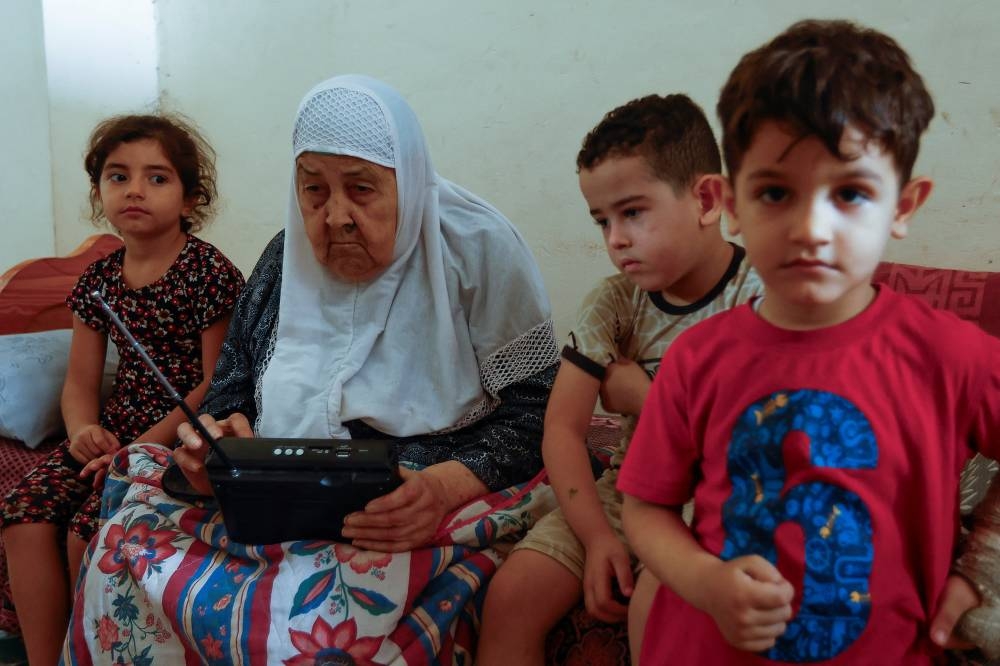
Palestinian woman Fawzeya Shaheen, 90, who lived through all Israeli-Palestinian wars dating back to 1948, sits with her grandchildren at her home, amid the ongoing Israeli-Palestinian conflict, in Khan Younis in the southern Gaza Strip Saturday. REUTERS
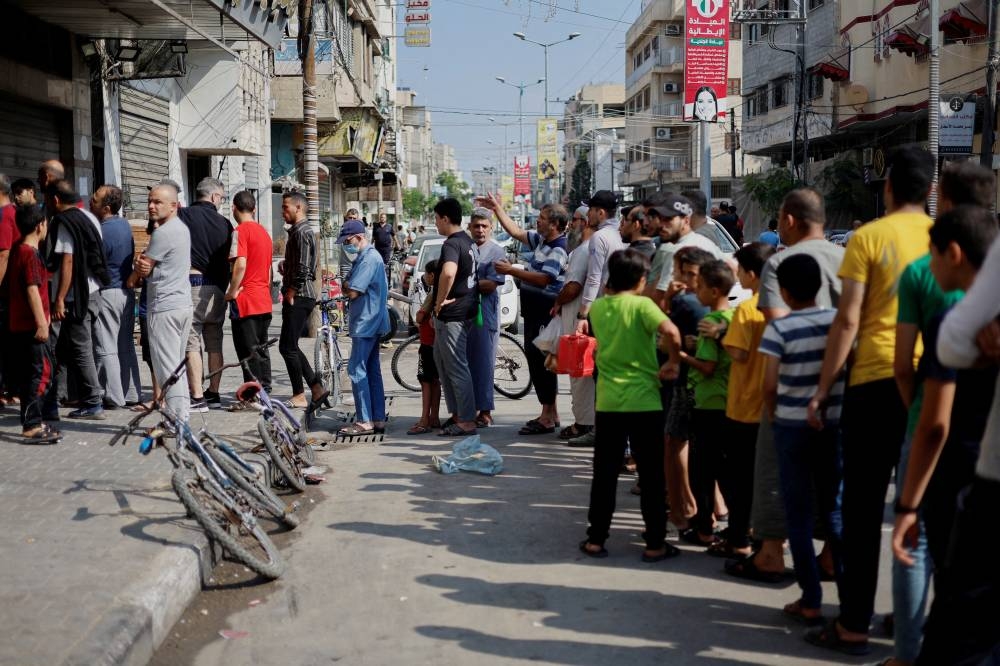
Palestinians wait to buy bread outside a bakery, amid the ongoing conflict between Israel and Palestinian Islamist group Hamas, in Khan Younis in the southern Gaza Strip Saturday. REUTERS
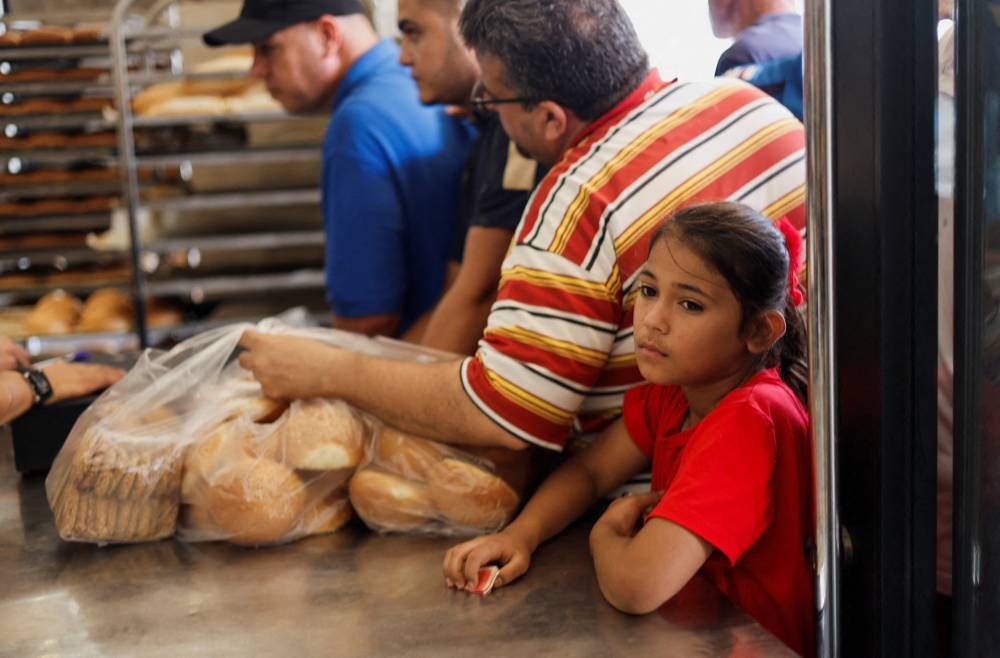
Palestinians wait to buy bread outside a bakery, amid the ongoing conflict between Israel and Palestinian Islamist group Hamas, in Khan Younis in the southern Gaza Strip Saturday. REUTERS
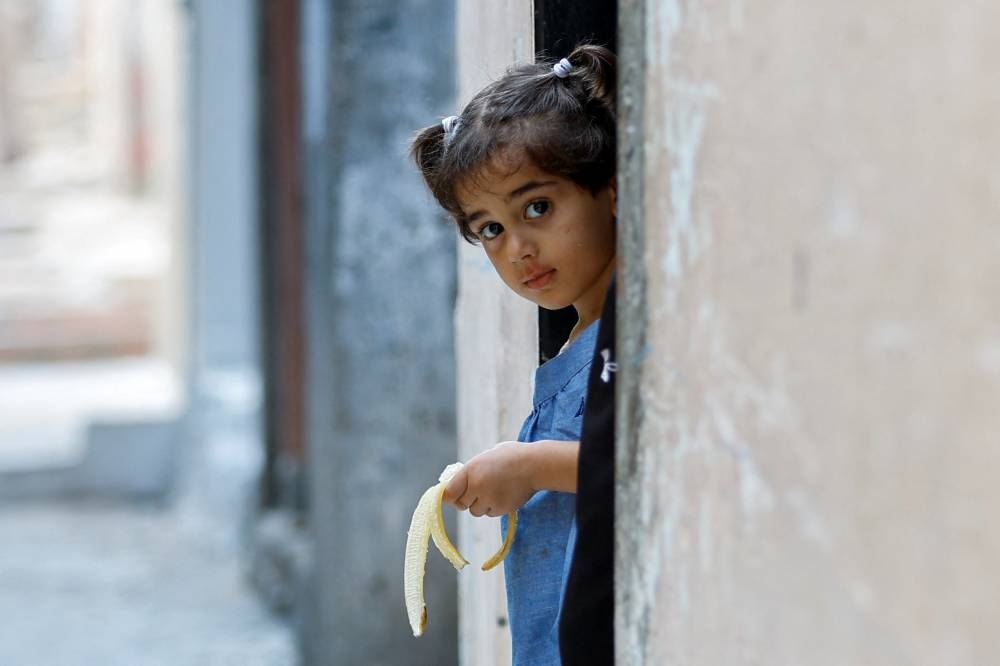
A Palestinian girl looks out of her family house, amid the ongoing Israeli-Palestinian conflict, in Khan Younis refugee camp in the southern Gaza Strip Saturday. REUTERS
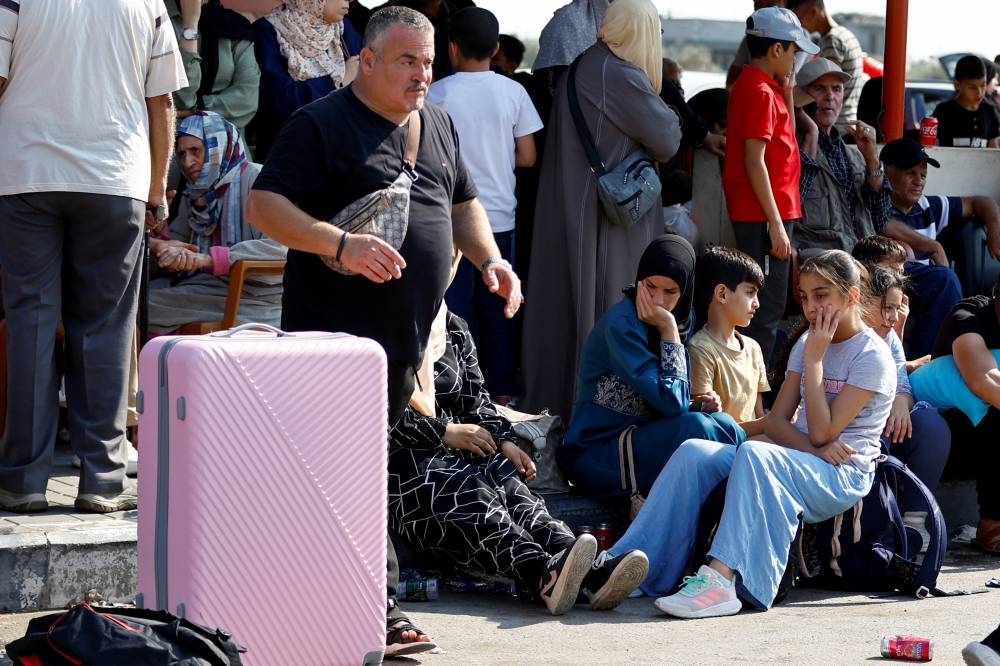
Palestinians with dual citizenship wait outside Rafah border crossing with Egypt in the hope of getting permission to leave Gaza, amid the ongoing Israeli-Palestinian conflict, in Rafah in the southern Gaza Strip Saturday. REUTERS
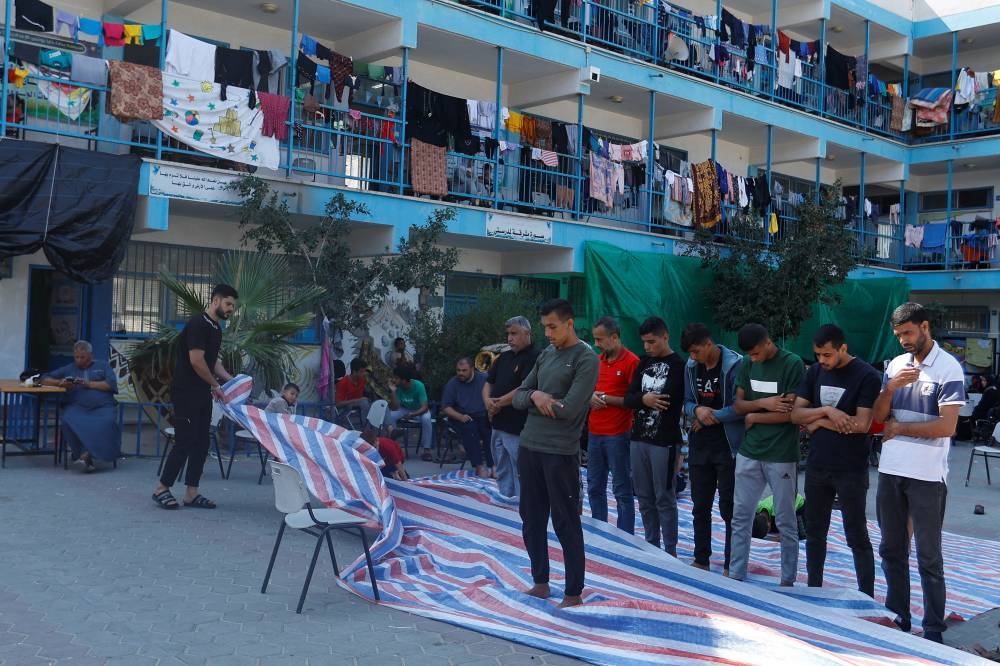
Palestinians, who fled their houses amid Israeli strikes, pray as they shelter at a United Nations-run school, after Israel's call for more than 1 million civilians in northern Gaza to move south, in Khan Younis in the southern Gaza Strip, Saturday. REUTERS
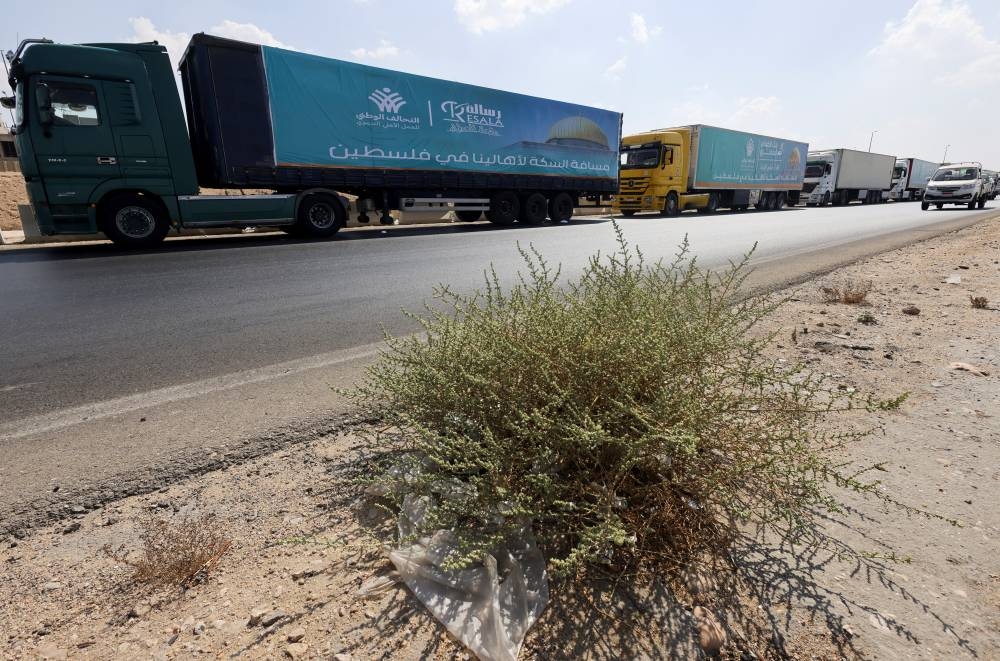
Trucks carrying humanitarian aid to Palestine wait on the desert road (Cairo - Ismailia) on their way to the Rafah border crossing to enter Gaza, amid the ongoing conflict between Israel and the Palestinian Islamist group Hamas, in Cairo, Egypt, Saturday. REUTERS
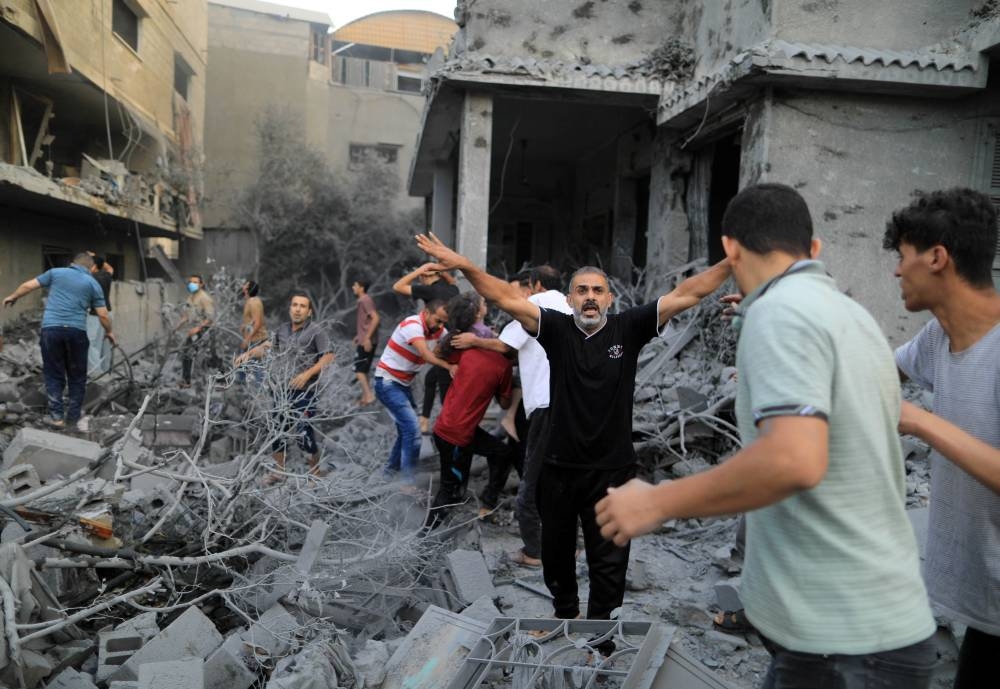
A Palestinian men react while a wounded girl is rescued from the rubble of a house after it was hit by Israeli strikes, in Khan Younis in the southern Gaza Strip, October 14, 2023. REUTERS/Yasser Qudih
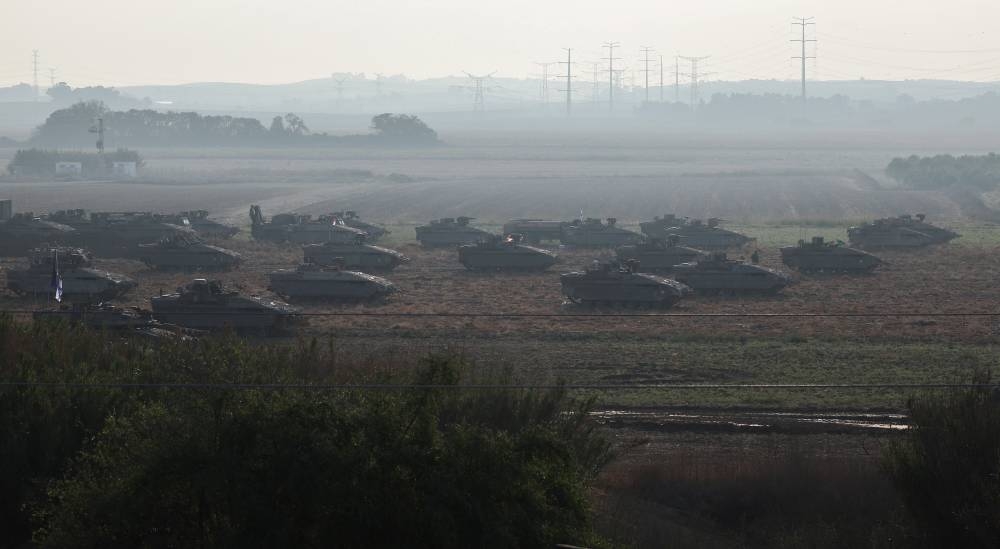
Israeli tanks and military vehicles take position near Israel's border with the Gaza Strip, in southern Israel, Saturday. REUTERS
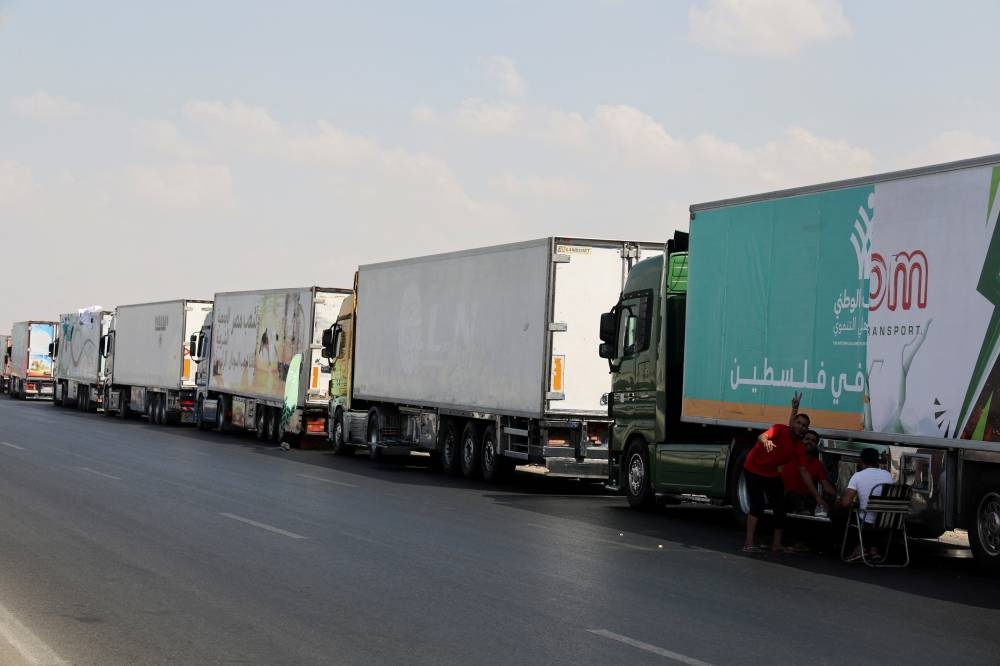
Trucks carrying humanitarian aid to Palestinians, wait on the desert road (Cairo - Ismailia) on their way to the Rafah border crossing to enter Gaza, amid the ongoing conflict between Israel and the Palestinian Islamist group Hamas, in Cairo, Egypt, Saturday. REUTERS
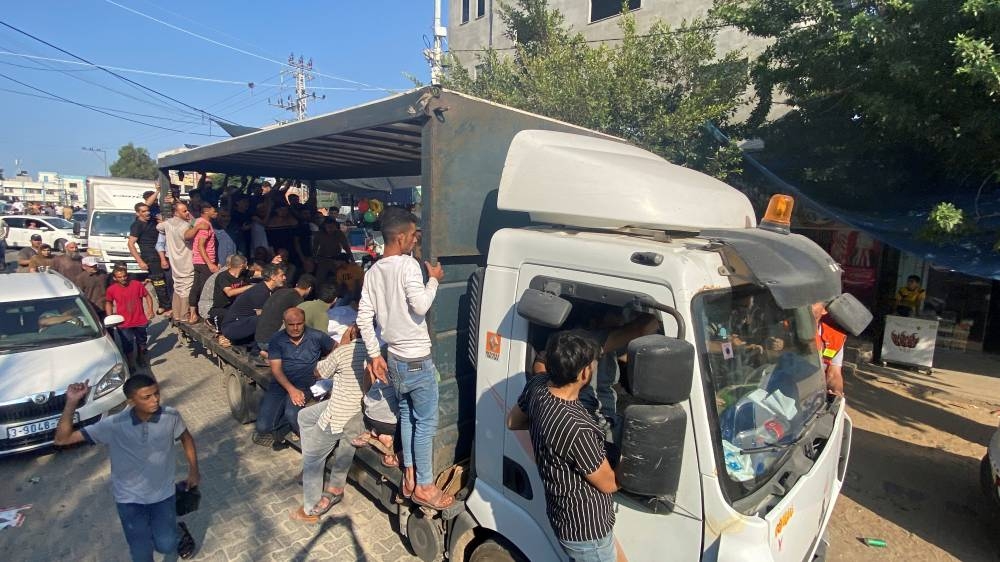
Mourners attend the funeral of Palestinians from al-Agha family, who were killed in Israeli strikes, in Khan Younis in the southern Gaza Strip Saturday. REUTERS
